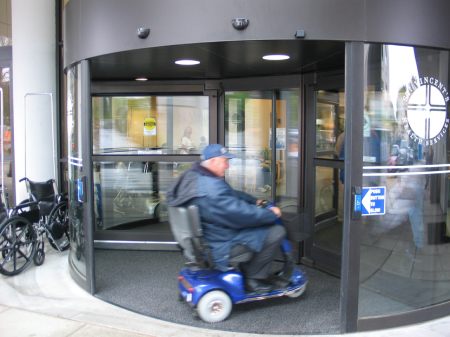| RECENT | JULY IS DISABILITY PRIDE MONTH: WHY AREN'T AUTOMATIC DOORS MANDATED BY THE ADA?Blog 27, May 2024
Disability Pride Month is coming in July. It is an annual opportunity to honor the history, experiences, struggles, and achievements of the differently abled. Its roots go back to the signing into law of the Americans with Disabilities Act (ADA) in July 1990. You might be surprised to hear that the ADA doesn't mandate automatic doors to qualify a building as "accessible." It's true; automatic doors were never required and still aren't. In fact, the ADA only requires that doorways be 32 inches wide and have "maneuvering clearance" for a wheelchair user to open the door and roll through. Even then, this is only required of 60% of a building's entrances. People with disabilities often point out that this is woefully inadequate. AAADM agrees. AAADM, of course, has long been an ally in the fight to make public buildings accessible to all. AAADM members were actively involved in the years-long campaign to make updates to the International Building Code (IBC) a reality. It culminated in IBC 1105.1.1, which includes automatic doors for entrances to public buildings that meet certain building occupant load thresholds. But the IBC isn't the ADA, and that's the reality we live in. Our hope would be that, as Disability Pride Month approaches, all building stakeholders think about how they can improve accessibility for the millions of people who use their facilities each day. This includes building owners, facility managers, architects, contractors, and even the public – because public pressure can often bring about positive change. It's simple, really. Do the right thing. If your facilities need upgrades to make them more accessible, get them done. Consider it an investment that will pay huge dividends by literally opening doors to new customers, patrons, and clients. More than three decades removed from passage of the ADA, too many public buildings are still difficult or impossible for people with mobility limitations to access. Upgrades such as ramps, wider doorways, and automatic doors help disabled patrons easily and independently visit you, make purchases from you, and use your services. SHARE ON: |
| 2025: Year in Review | |
| Opening Doors to Inclusion: Automatic Doors Reflect the Values of International Day of Persons with Disabilities | |
| National Disability Employment Awareness Month Celebrates 80 Years; Our Industry Does, Too. | |
| Absent Mandates, Automatic Doors Still Best for Schools | |
| AAADM Adds 'Building Code Tracker' to Website; Lists States Embracing IBC Accessibility Mandate | |
| Opening Doors to Better Healthcare: The Power of Automation | |
| Disability Pride Month 2025 | |
| AAADM Joins PASS for Safer Schools | |
| Automatic Doors Add More 'Service' to Foodservice | |
| Five Years of 'Magic': National Automatic Door Day | |
| 2024: Year in Review | |
| International Persons with Disabilities Day: Enhancing Accessibility for All | |
| Vote for Accessibility: Removing Physical Barriers at Polling Places | |
| Opening "Automatic" Doors for Employees with Disabilities | |
| The Modern Office Building in a No-Touch World | |
| Summer's Here and the Time is Right for ... Addressing School Access | |
| July is Disability Pride Month: Why Aren't Automatic Doors Mandated by the ADA? | |
| The Important Work of the U.S. Access Board | |
| Rolling Out the Red Carpet for National Automatic Door Day | |
| New Certification Program for 2024 | |
| International Persons with Disabilities Day | |
| The Right to Vote | |
| The Modernity and Aesthetics of Automatic Doors | |
| July is Disability Pride Month | |
| A Lot to Learn | |
| ASSA ABLOY's Dave Timmerman is New President of American Association of Automatic Door Manufacturers | |
| Automatic Doors: Champions of Access | |
| AAADM Leadership Delivers U.S. Access Board Webinar | |
| AAADM at 30: Safety is the Great Uniter | |
| Philadelphia Freedom | |
| Door Doctors | |
| Safe With Us | |
| State of the ADA | |
| A Clear Path to Voting | |
| "GREEN" Doors: Earth Day and Automatic Doors | |
| Do the right things, get money back | |
| The Second Annual Automatic Door Day | |
| FOOD FOR THOUGHT Restaurant patrons overwhelmingly say they want automatic doors | |
| My Electrician Says He Can Fix My Automatic Door. Should I Let Him? | |
| Automatic Doors Have Graduated Beyond Entryways | |
| Greet Your Guests in the New No-Touch World | |
| Automatic Door Day | |
| IBC Building Code | |

